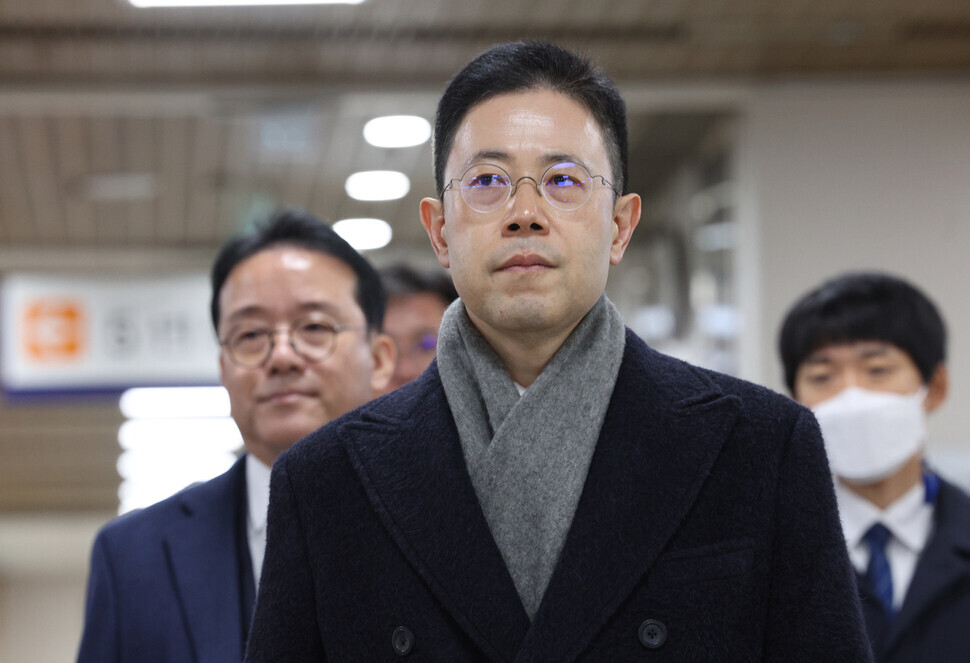hankyoreh
Links to other country sites 다른 나라 사이트 링크
[Editorial] Thorough probe needed after prosecutor convicted for conspiring to target political figures with complaints

Deputy chief prosecutor Son Jun-sung was sentenced to a year in prison on Wednesday after being convicted of conspiring to target political figures with criminal complaints.
The incident in question occurred in the lead-up to the general election in 2020, when prosecutors delivered draft complaints to the then-opposition United Future Party (predecessor of the currently ruling People Power Party), which they encouraged it to submit against major figures in the then-ruling Democratic Party.
This was a scandalous crime in which prosecutors violated their obligation to uphold political neutrality and colluded with a particular political party. If anything, a year in prison seems like a slap on the wrist.
The Corruption Investigation Office for High-ranking Officials (CIO), which investigated the incident, indicted only Son, without determining any involvement further up the hierarchy from him. Now that the core charges have been proven factual, a more thorough investigation is in order.
The 27th criminal panel of the Seoul Central District Court recognized the key charge, namely that Son was involved in drafting the complaints and delivered them to current PPP lawmaker Kim Woong.
The court stated that this was a “flagrant violation of political neutrality, which is a core value that the prosecutors must uphold.” While it acquitted Son of Public Official Election Act violations — determining that the mere drafting and delivery of the complaints was not in itself enough to influence the election outcome — it did acknowledge the intention to influence the election, which it called a “grave matter” that bears “serious criminal liability.”
As investigation information policy officer for the Daegu District Prosecutors’ Office at the time, Son was known as the “eyes and ears” of the prosecutor general, and several prosecutors under his command were involved in the criminal activities.
In addition, one draft complaint listed Kim Keon-hee, the wife of then-prosecutor general Yoon Suk-yeol, as one of the victims, along with current PPP emergency committee chairperson Han Dong-hoon, who chaired the Supreme Prosecutors’ Office anti-corruption division at the time. Anyone can tell that this was not the sort of crime that an investigation information policy officer could have carried out without orders or support from higher up.
But the CIO decided against pressing charges against Yoon or Han without thoroughly investigating the matter. Given the gravity of the case, additional investigation is needed to bring the full picture to light.
The prosecutors also deserve criticism for focusing simply on shielding their own and trying to smooth everything over.
The CIO turned the case over to them because it did not have the authority to investigate Kim Woong, who at the time of the incident was a UFP candidate rather than a public official. While the CIO determined that he had been complicit with Son, prosecutors opted not to press charges against him.
In light of the court’s decision, we can only conclude that the prosecutors chose to go easy on Kim — himself a former prosecutor — and try to wrap up a case that put their more shameful parts on display.
Also outrageous is the fact that while the trial was going on, the Daegu District Prosecutors’ Office decided not to pursue charges against Son, and even subsequently promoted him to chief prosecutor. Here, we see once again why we need a body like the CIO to handle investigations and indictments for crimes involving prosecutors.
Please direct questions or comments to [english@hani.co.kr]

Editorial・opinion
![[Editorial] Intensifying US-China rivalry means Seoul must address uncertainty with Beijing sooner than later [Editorial] Intensifying US-China rivalry means Seoul must address uncertainty with Beijing sooner than later](https://flexible.img.hani.co.kr/flexible/normal/500/300/imgdb/original/2024/0517/8117159322045222.jpg) [Editorial] Intensifying US-China rivalry means Seoul must address uncertainty with Beijing sooner than later
[Editorial] Intensifying US-China rivalry means Seoul must address uncertainty with Beijing sooner than later![[Column] When ‘fairness’ means hate and violence [Column] When ‘fairness’ means hate and violence](https://flexible.img.hani.co.kr/flexible/normal/500/300/imgdb/original/2024/0516/7417158465908824.jpg) [Column] When ‘fairness’ means hate and violence
[Column] When ‘fairness’ means hate and violence- [Editorial] Yoon must stop abusing authority to shield himself from investigation
- [Column] US troop withdrawal from Korea could be the Acheson Line all over
- [Column] How to win back readers who’ve turned to YouTube for news
- [Column] Welcome to the president’s pity party
- [Editorial] Korea must respond firmly to Japan’s attempt to usurp Line
- [Editorial] Transfers of prosecutors investigating Korea’s first lady send chilling message
- [Column] Will Seoul’s ties with Moscow really recover on their own?
- [Column] Samsung’s ‘lost decade’ and Lee Jae-yong’s mismatched chopsticks
Most viewed articles
- 1Xi, Putin ‘oppose acts of military intimidation’ against N. Korea by US in joint statement
- 2For new generation of Chinese artists, discontent is disobedience
- 3[Editorial] Transfers of prosecutors investigating Korea’s first lady send chilling message
- 4[Column] When ‘fairness’ means hate and violence
- 5[Editorial] Intensifying US-China rivalry means Seoul must address uncertainty with Beijing sooner t
- 6How K-pop broke the internet — and broke into the US market
- 7[Exclusive] Unearthed memo suggests Gwangju Uprising missing may have been cremated
- 8‘Shot, stabbed, piled on a truck’: Mystery of missing dead at Gwangju Prison
- 9Naver to acquire Canada’s Wattpad to fuel its IP ambitions
- 10AI, robots won’t free us from work - they’ll make our jobs worse